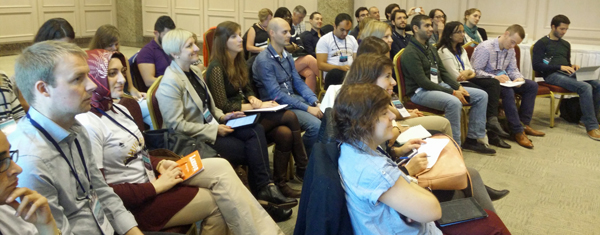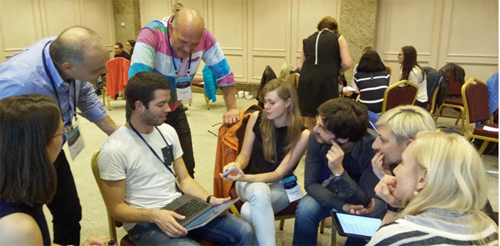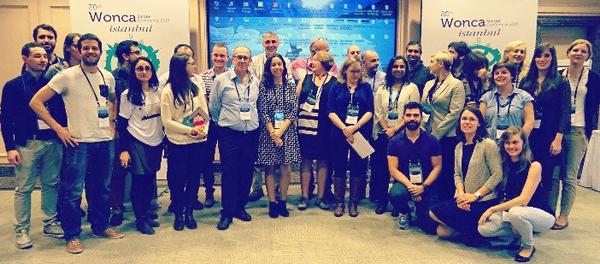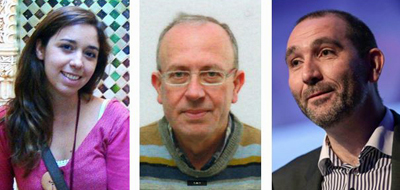Research Workshop at WONCA Istanbul

A one-day workshop on Research in Primary Health Care was organised by a joint collaboration between the European General Practice Research Network (EGPRN) and the Vasco da Gama Movement (VdGM) during the VdGM preconference (Istanbul, 21st October).
The main aim was to provide young family doctors and residents with the knowledge, skills and attitudes necessary to perform clinical research in a Primary Care setting. The specific objectives included to help participants formulate research questions, to provide a basic understanding of epidemiological methods and biostatistics, and to develop critical faculties for critical appraisal of the literature. The workshop was designed to achieve a balance between theoretical and practical learning, and between conceptual and factual material.

There were 30 participants from a number of European countries including Italy, Portugal, Ireland, United Kingdom, Belgium, Finland, Estonia, France and Germany, with an average age of 30 years. 53% were General Practice / Family Medicine (GP/FM) residents with the remainder being young family doctors.
The workshop contained about eight hours of teaching with regular breaks and adequate discussion time after each didactic session. The contents included 1) formulation of a research question, 2) consideration about writing and publishing, 3) quantitative methods, 4) qualitative methods, and, 5) literature research and critical appraisal of the literature.
At the end of the day, the participants were divided into four groups and challenged to design a research question inspired by a humorous question arising from their experience as VdGM preconference participants, and to suggest a suitable methodological approach. The next day, all groups shared their questions with all VdGM participants in the “Discussion Groups” session. Using their “humorous” questions as a starting point, all groups identified, outlined and discussed key concepts in research, including such factors as the importance of proper definition of the variables, awareness of bias and adjustment for confounding factors, and assessment of statistical significance.
A survey was conducted to understand the perspectives of young family doctors towards research and how prepared they feel to engage with research activity. Although 17.6% had previous research training during their medical degree, only 6% mentioned having had specific research training during FM/GP residency. Regarding publishing activity, 23.5% of the participants had already authored papers in the field of primary care. All participants considered that research training was a core competence of a family doctor, pointing out its relevance for personal development (76.5%), clinical decision making (76.5%), critical appraisal of the literature (64.7%) and for personal curricula improvement (47.1%).

Facilitators of the course were: Ferdinando Petrazzuoli, Nicola Buono, Laurence Coblentz-Baumann, Michael Harris and Hans Thulesius from the EGPRN Educational Committee, Ana Luisa Neves from the EGPRN Public Relations and Communications Committee and VdGM/EGPRN Liaison, and Jelle Stoffers, Editor-in-Chief of the European Journal of General Practice (EJGP). The course was made possible by collaboration between Jean Karl Soler (former EGPRN chair), Mehmet Ungan (former EGPRN vice-chair and new EGPRN chair), and Peter Sloane (VdGM President).
This seminal experience brought us closer to the needs of young GP/FMs regarding research. It highlighted the need for specific studies aimed at clarifying the differences and similarities between research training within Europe. Identifying existing strengths and weaknesses is a crucial first step in identifying key opportunities for further improvement in research within European family medicine, particularly for young family doctors.
 Ana Luisa Neves (EGPRN Educational Committee), Ferdinando Petrazzuoli
(EGPRN Public Relations and Communications Committee and VdGM/EGPRN
Liaison), Peter Sloane (VdGM President).
Ana Luisa Neves (EGPRN Educational Committee), Ferdinando Petrazzuoli
(EGPRN Public Relations and Communications Committee and VdGM/EGPRN
Liaison), Peter Sloane (VdGM President).